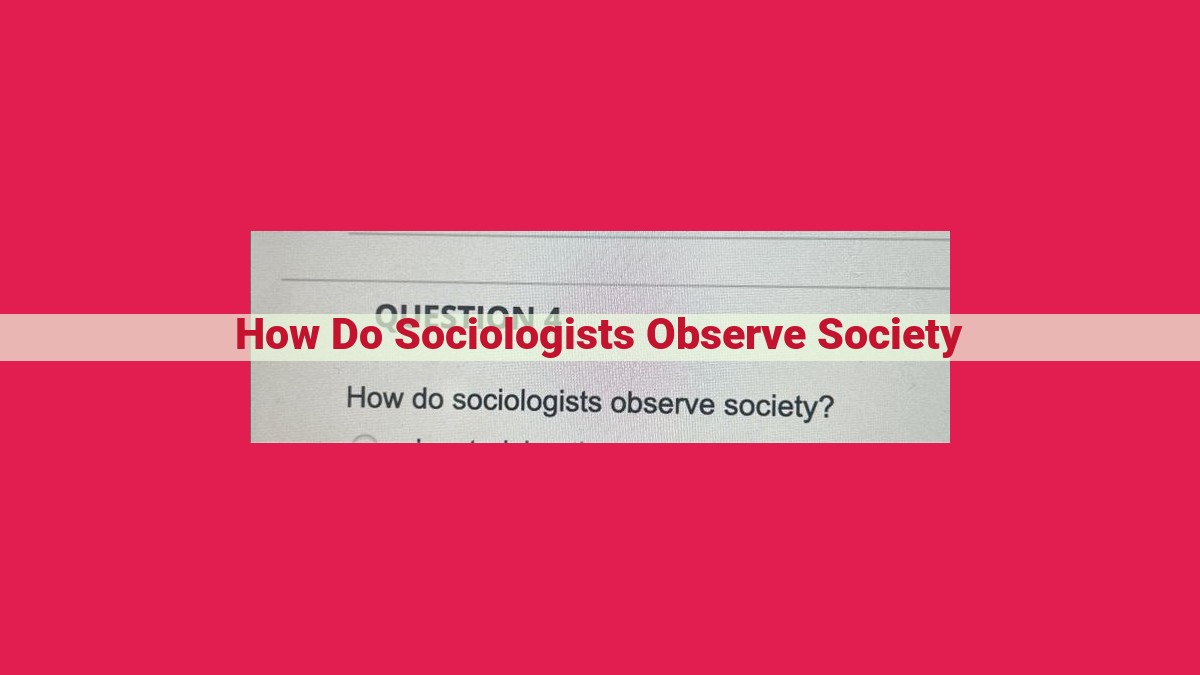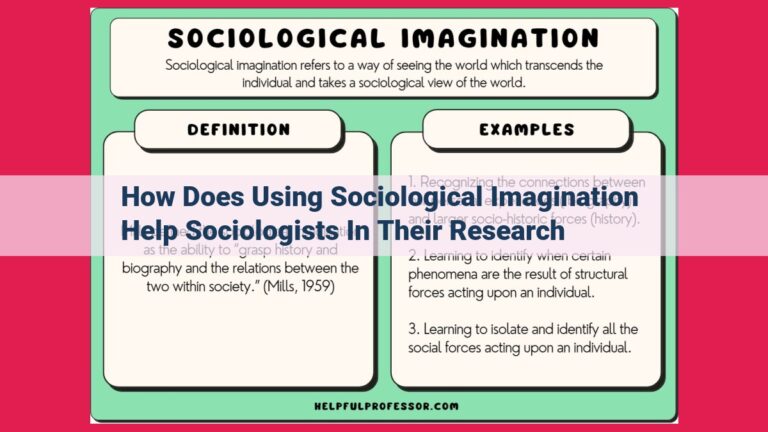Sociological Research Methods: Unlocking Social Phenomena

Sociologists observe society through various methods, including participant observation, where the researcher immerses themselves within the group being studied, and non-participant observation, where they observe from a distance. Ethnography involves extended immersion to deeply understand cultural practices, while case studies focus on individual phenomena. Surveys collect data from a wider sample, and experiments establish cause-and-effect relationships. By combining methods, sociologists gain a holistic view of social life. Ethical considerations ensure responsible research practices, and observation remains a powerful tool for understanding social phenomena.
Define sociology and highlight its focus on human social behavior.
Observation in Sociology: Unveiling the Secrets of Social Behavior
Welcome to the fascinating world of sociology! It’s a field that delves into the intricate tapestry of human social behavior, exploring the interactions, patterns, and structures that shape our societies. Among the various methods employed by sociologists, observation stands out as a cornerstone. It allows researchers to get up close and personal with the people they study, providing an invaluable window into the complexities of social life.
Observing the Unseen: The Purpose of Observation
Observation is not just about watching people. It’s a scientific endeavor that involves carefully recording and analyzing behavior in order to uncover hidden patterns and insights. Sociologists use observation to investigate a wide range of phenomena, from the dynamics of small groups to the interplay of social institutions. By observing people in their natural settings, researchers can gain a deeper understanding of their motivations, interactions, and the cultural norms that govern their behavior.
This method is crucial because it allows researchers to tap into the subjective experiences of individuals, something that surveys and experiments often fail to capture. By observing people’s nonverbal cues, gestures, and expressions, sociologists can uncover nuances of social interaction that might otherwise remain hidden from view.
The Significance of Observation in Sociological Research: Unveiling the Hidden Truths
Sociology, the study of human social behavior, seeks to uncover the intricate patterns and dynamics that shape our lives. Observation stands as a primary method in this field, allowing sociologists to immerse themselves in the real-world settings where society unfolds.
Why Observation Matters
Observation provides a direct and unfiltered window into the lives of individuals and groups. It enables researchers to perceive and record the often-subtle nuances of social interactions that might otherwise go unnoticed. By observing how people behave, interact, and communicate, sociologists can gain a deeper understanding of social norms, values, and patterns of behavior.
Moreover, observation facilitates the study of naturally occurring phenomena in their authentic contexts. Unlike surveys or experiments, which often rely on participants’ self-reporting, observation allows sociologists to capture behavior in its raw and unadulterated form. This approach provides a level of realism and validity that other methods may lack.
Participant Observation: Immersing in the Heart of the Group
Participant observation, a cornerstone of sociological research, plunges the researcher into the very core of the group being studied. Stepping beyond detached observation, the sociologist becomes a participant, an active member navigating the social landscape alongside the subjects. This intimate engagement unlocks invaluable insights into the intricacies of human behavior and social norms.
Through prolonged, direct, and unobtrusive observation, the researcher immerses themselves in the daily life of the group. They share experiences, engage in conversations, and participate in various activities, often over an extended period. This fosters trust and rapport, allowing the researcher to witness firsthand the unspoken rules, values, and beliefs that shape group dynamics.
Unveiling the hidden complexities of rituals, interactions, and power structures, participant observation offers a rich tapestry of qualitative data. The researcher becomes an insider, privy to the nuances and subtleties that often escape outsiders. By blending with the group, they gain a comprehensive understanding of its culture, norms, and shared experiences.
Non-Participant Observation: Glimpsing Society from Afar
In the realm of sociology, observation forms an indispensable cornerstone, enabling researchers to delve into the intricate tapestry of human behavior. Non-participant observation, a technique often employed by sociologists, offers a unique vantage point, allowing researchers to observe subjects from a detached distance.
Unlike participant observation, where researchers immerse themselves within the group they study, non-participant observation maintains a physical and emotional separation. Researchers observe subjects without engaging in direct interactions, akin to spectators observing a play from the balcony. This distance provides a discreet lens through which to observe social behavior, capturing moments that might otherwise remain hidden.
For instance, researchers studying a subculture might observe its members at a local gathering. They document gestures, interactions, and conversations, noting the unwritten rules and social norms that guide behavior. This discretion allows them to gain insights into the subculture without influencing its natural dynamics.
Non-participant observation excels in capturing overt behaviors that occur in public spaces, such as parks, shopping malls, or public transportation. By recording these observable actions, researchers can draw inferences about social patterns, group dynamics, and the invisible forces that shape them.
However, non-participant observation also poses challenges. Researchers may face perceptual biases or misinterpret observations due to their external position. Additionally, gaining access to certain settings may be difficult, limiting the scope of research.
Yet, despite these limitations, non-participant observation remains a valuable tool in the sociological toolbox. By observing from a distance, researchers can gather rich data on social interactions, uncovering the unseen threads that weave the fabric of our communities.
Ethnography: Unveiling the Fabric of Culture
Ethnography, a subtype of participant observation, immerses the researcher deeply into the heart of a community or group. It’s like stepping into a foreign land, where the researcher becomes an insider, observing the intricate web of social interactions, beliefs, and practices from within. By living and breathing alongside the participants, the researcher gains an unparalleled understanding of their culture.
Ethnographers spend extended periods of time, often months or even years, immersed in the community they study. They participate in everyday activities, attend gatherings, and engage in conversations that reveal the **hidden patterns and meanings that shape the group’s social fabric. Through this intimate contact, ethnographers develop a holistic understanding of the culture that goes beyond superficial observations.
Ethnography: Uncovering the Tapestry of Cultural Immersion
Benefits of Ethnographic Research
Ethnography, a type of participant observation, offers unparalleled insights into the intricate tapestry of culture. By immersing themselves deeply within the lives of a community or group, researchers gain a firsthand, insider’s perspective on their beliefs, values, and everyday practices.
This extended immersion allows researchers to observe social interactions, rituals, and daily routines in their natural context, providing a more authentic and nuanced understanding than short-term observations. Ethnography also fosters trust and rapport between the researcher and the community, enabling access to private and intimate aspects of life.
Limitations of Ethnographic Research
While ethnographic research offers rich insights, it also presents certain limitations. The lengthy and immersive nature of the research can be time-consuming and resource-intensive. Additionally, researchers may face challenges in establishing objectivity due to their extended involvement and potential personal biases.
The complexity and diversity within different communities also present challenges. Researchers must be sensitive and respectful of cultural norms and customs to avoid causing harm or misinterpreting observations. Furthermore, the small sample size and lack of generalizability of ethnographic research may limit its applicability to broader populations.
Despite these limitations, ethnographic research remains a valuable tool for sociologists seeking to deeply understand the intricacies of human culture. By immersively observing and engaging with communities, researchers gain unique and indispensable insights into the ways humans live, interact, and make sense of their world.
Case Study: Exploring the Intricacies of Individual Phenomena
In the realm of sociology, understanding the nuances of individual experiences and behaviors is crucial. This is where the concept of case study comes into play. A case study is an in-depth, qualitative analysis of a person, group, or event. It involves meticulous observation and comprehensive exploration of a specific phenomenon within its unique context.
Sociologists employ case studies to uncover the intricate details and complexities of social issues. They immerse themselves in the subject’s life, workplace, or any relevant setting. Through prolonged engagement, researchers gain a profound understanding of the individual’s perspective, experiences, and motivations. This allows them to identify patterns, draw meaningful conclusions, and develop contextualized theories.
Unlike ethnographies, which focus on broader cultural groups, case studies delve into the specificities of individual cases. They help unravel the unique factors, circumstances, and experiences that shape individual behaviors, beliefs, and identities. By examining such micro-level phenomena, sociologists can gain valuable insights into the macroscale workings of society.
Case Studies: Analyzing Individual Phenomena
Case studies provide an in-depth examination of a single phenomenon or small group, enabling sociologists to delve into specific contexts and unravel complex interactions. Unlike ethnographies, which focus on cultural immersion, case studies offer a nuanced analysis of isolated cases, such as a particular organization, individual, or event.
Unlike participant observation, which requires the researcher to become part of the studied group, case studies may involve various observation methods, including interviews, archival research, and document analysis. This flexibility allows researchers to gather a wide range of data, constructing a comprehensive understanding of the case under investigation.
While ethnographies provide insights into broad cultural patterns, case studies pinpoint specific dynamics, offering a micro-level perspective on social phenomena. By zooming in on specific individuals or events, sociologists can unveil hidden processes and patterns that might not be apparent in larger-scale studies.
Observation Methods in Sociology: A Journey into Human Behavior
Sociology, the study of human social behavior, relies heavily on observation as a primary method to gain insights into complex social phenomena. Observation involves the systematic and objective examination of individuals or groups in their natural settings.
Observation methods come in two main types: participant and non-participant. Participant observation immerses the researcher within the group being studied, allowing for a deeper understanding of their interactions and perspectives. In contrast, non-participant observation maintains a distance between the researcher and the subjects, minimizing potential biases.
Among the various observation methods used in sociology, surveys play a vital role in collecting data from large populations. Surveys involve administering questionnaires or structured interviews to gather information on attitudes, opinions, and behaviors. They offer a quantitative approach to research, allowing sociologists to make generalizations and draw inferences about society.
Surveys can be conducted in various formats: paper-based, online, or through telephone interviews. They enable researchers to reach respondents from different backgrounds and geographies, providing a broader perspective on social issues. By carefully designing surveys, sociologists can obtain reliable and representative data that informs policy decisions and helps us better understand the world we live in.
Advantages of Surveys in Sociological Research
Surveys provide numerous advantages in sociological research. Firstly, they allow researchers to gather data from a broad and diverse sample. By distributing surveys widely, sociologists can capture the perspectives of individuals from various backgrounds, ensuring a more inclusive understanding of social phenomena.
Secondly, surveys are relatively cost-effective and efficient. Compared to other observational methods like participant observation or ethnography, surveys require fewer resources and can be conducted more quickly. This makes them a valuable tool for researchers with limited time or financial constraints.
Thirdly, surveys enable researchers to obtain quantitative data. This numerical information can be easily analyzed using statistical techniques, allowing sociologists to draw precise conclusions and make generalizable inferences about the population being studied.
Disadvantages of Surveys in Sociological Research
However, surveys also have certain limitations:
Firstly, surveys rely on self-reported data. Respondents may not always be truthful or accurate in their answers, potentially introducing response bias into the results.
Secondly, surveys are limited in their ability to capture context. Unlike participant observation or ethnography, surveys do not allow researchers to directly observe behaviors or explore social interactions in real-world settings.
Thirdly, surveys can be subject to sampling bias. If the sample is not randomly selected or representative of the target population, the results may not accurately reflect the broader population.
Despite these limitations, surveys remain a valuable tool in sociological research. By carefully designing and implementing surveys, researchers can minimize bias and ensure the reliability and validity of their findings.
Explain the purpose of experiments in sociology.
## 6. Experiments: Unraveling Cause-and-Effect Relationships
In the realm of sociology, experiments stand as invaluable tools, granting researchers the power to unravel the intricate tapestry of cause-and-effect relationships. Unlike observational methods, experiments offer a controlled environment where variables can be meticulously isolated and manipulated.
The essence of sociological experiments lies in manipulating one or more independent variables (the hypothesized cause) while observing changes in the dependent variable (the hypothesized effect). By varying the independent variable and carefully measuring the dependent variable, sociologists can establish whether and to what extent the independent variable influences the dependent variable.
Consider the example of a study examining the impact of social media on political participation. By randomly assigning participants to different levels of social media exposure (experimental groups), researchers can observe whether their voting behavior (dependent variable) is affected by social media usage (independent variable).
Through experimentation, sociologists can delve into complex social phenomena, unraveling causal relationships and identifying the mechanisms behind social change. From understanding the impact of housing policies on neighborhood crime to exploring the effects of educational programs on student achievement, experiments have proven instrumental in advancing our knowledge of social processes.
Experimental Research: Delving into Cause-and-Effect Relationships
In the realm of sociological research, experiments stand out as a pivotal tool for establishing cause-and-effect relationships between variables. Unlike observational methods that passively record events, experiments actively manipulate variables to isolate their effects.
Imagine a researcher seeking to understand how social media usage influences political participation. They design an experiment where they randomly assign participants to two groups: one with increased access to social media and the other with restricted access. By manipulating the variable of social media exposure, they can control for other factors that could also contribute to political participation, such as education level or political affiliation.
After a period of exposure, the researcher observes and measures the participants’ political participation. By comparing the results between the two groups, they can determine the effect of social media usage on this behavior. If the group with increased access shows a significant increase in political participation, they conclude that social media exposure causes greater civic engagement.
Of course, experimental research also poses its own challenges. Researchers must ensure that the manipulation of variables is both ethical and effective in isolating the desired effect. Additionally, the generalizability of experimental findings to other groups or settings requires careful consideration.
Despite these nuances, experiments remain an invaluable tool for sociologists who seek to understand the complex interplay of social factors. By manipulating variables and observing their effects, experimental research provides a rigorous foundation for establishing cause-and-effect relationships, shaping our knowledge of how society operates.
Combining Observation Methods: Unveiling the Tapestry of Social Reality
Observation, a cornerstone of sociological research, is not a monolithic technique. By combining different observation methods, sociologists weave a richer tapestry of understanding about social phenomena. This multi-method approach enhances the depth, validity, and reliability of their findings.
Consider the participant observer, immersed within the community they study. They experience the group’s daily life, fostering a deep understanding of its culture and social dynamics. However, the observer’s presence may subtly alter the behavior of the participants.
Non-participant observation offers a more objective perspective. Researchers observe from a distance, avoiding direct contact with the group. This minimizes the potential bias of participation but limits their ability to fully comprehend the group’s inner workings.
By combining these methods, sociologists gain a more comprehensive view. Participant observation provides an intimate perspective, while non-participant observation adds a wider lens. This triangulation strengthens the validity of their conclusions.
Furthermore, different observation methods are suited for specific research questions. Ethnography, an extended immersion technique, excels in exploring cultural practices and beliefs. Case studies, on the other hand, focus on understanding individual phenomena within their context.
By integrating these methods, sociologists paint a holistic picture of social reality. Combining the strengths of each approach illuminates the complexities and nuances of human society. This multi-dimensional perspective ensures that sociological insights are both accurate and comprehensive, revealing the hidden threads that weave the fabric of our social world.
Observation Methods in Sociology: A Window into Social Reality
Sociology, the study of human social behavior, seeks to understand the intricate workings of our world. Observation is a cornerstone of sociological research, allowing sociologists to delve into the depths of social life.
Types of Observation
Participant Observation: Sociologists immerse themselves in the group they study, participating in their activities and sharing their experiences. This intimate approach provides invaluable firsthand insights.
Non-Participant Observation: Researchers observe from a distance, avoiding direct participation. This technique allows for a more objective perspective and minimizes the influence of the observer on the subjects.
Ethnography
Ethnography is a type of participant observation that involves extended immersion in a culture. Sociologists live among a community, observe their daily lives, and learn about their values, beliefs, and norms. This method yields deep cultural understanding.
Case Study
A case study focuses on an individual phenomenon or group. Sociologists carefully examine the context, history, and behavior of the subjects. Case studies offer detailed insights into specific situations and can complement broader research.
Combining Methods
Sociologists often combine observation methods to gain a comprehensive understanding of social phenomena. For instance, participant observation can provide context for survey data, while experiments can test hypotheses generated from ethnographic research.
The study of “Social Networks among Urban Homeless Individuals” by Smith and Jones integrated participant observation, surveys, and interviews. The participant observation allowed the researchers to establish rapport and gain trust within the community. Surveys provided quantitative data on network size and composition, while interviews delved into the personal experiences of individuals. By combining these methods, the researchers gained a holistic understanding of social networks among the urban homeless population.
Ethical Considerations
Responsible research demands ethical considerations. Sociologists must obtain informed consent, protect participant privacy, and ensure that their research does not cause harm.
Observation methods in sociology provide powerful tools for unveiling social patterns, understanding human behavior, and shaping policies. Sociologists continue to refine and innovate these techniques, expanding our knowledge of the social world. Observation remains an indispensable cornerstone of sociological inquiry, allowing us to peer into the tapestry of human experience.
Observation Methods in Sociology: A Guide to Understanding Social Phenomena
Ethical Considerations: Ensuring Responsible Research
In the realm of sociological research, ethical considerations hold paramount importance to ensure responsible and respectful engagement with the subjects of study. Sociologists have a moral obligation to uphold the privacy and confidentiality of their participants, safeguarding their personal information and avoiding any potential harm or exploitation.
Informed consent is an essential cornerstone of ethical research. Sociologists must provide clear and concise information about the study’s purpose, procedures, and potential risks to potential participants. Participants should fully understand their rights and responsibilities, allowing them to make informed decisions about their involvement.
Respect for cultural diversity is paramount. Sociologists must approach different cultures with sensitivity and humility, respecting local customs and values. They should actively avoid imposing their own cultural biases or stereotypes on the research process or findings.
Sociologists should also ensure that their research contributes positively to society. They have a responsibility to use their findings to promote social justice, equality, and well-being. Any potential negative consequences of the research must be carefully considered and mitigated to minimize harm.
By adhering to stringent ethical guidelines, sociologists can ensure that their observations are accurate, unbiased, and respectful. Ethical research practices not only protect the rights of participants but also enhance the integrity and credibility of sociological findings.
Ethical Considerations: Ensuring Responsible Research
When conducting research, sociologists bear a heavy ethical responsibility to ensure their methods are just as ethical as their intentions. Respecting the privacy and rights of participants is paramount.
Informed Consent:
Before any observation begins, participants must be informed of the purpose of the study, its potential impact, and their right to withdraw. They should fully understand how their data will be used and have ample opportunity to ask questions.
Privacy Protection:
Observers must prioritize the confidentiality and anonymity of participants. Data should be stored securely and stripped of personal identifiers when possible. Pseudonyms or other measures can protect participant identities while still allowing for meaningful analysis.
Other Guidelines:
Beyond informed consent and privacy, sociologists must adhere to ethical principles such as avoiding harm, respecting cultural sensitivities, and seeking independent review of their research methods. Ethical guidelines help ensure that observations are conducted with sensitivity and integrity.
By adhering to these ethical considerations, sociologists can conduct ethical and responsible research that respects the rights and dignity of participants while advancing our understanding of social phenomena.
Summarize the different observation methods used by sociologists.
Observation: A Sociologist’s Window to the World
Sociology, the study of human social behavior, seeks to uncover the intricacies of our interactions. Observation, a fundamental method in this field, allows sociologists to witness firsthand the ways in which we live, work, and play. From bustling city streets to intimate gatherings, observation unveils the tapestry of human experience.
Types of Observational Methods
Sociologists employ various observational methods to gather data:
- Participant Observation: Researchers immerse themselves in the community they study, becoming active participants. This intimate involvement provides a rich tapestry of lived experiences and deepens their understanding of the group’s culture.
- Non-Participant Observation: Observers remain on the sidelines, meticulously recording behaviors and interactions without direct engagement. This detached approach allows for objective documentation and minimizes the impact of the researcher’s presence.
Ethnography: Diving into Culture
Ethnography, a form of participant observation, takes immersion to a new level. Researchers spend extended periods in a specific cultural setting, immersing themselves in its rhythms and rituals. Observing daily life, social interactions, and belief systems provides a profound understanding of the community’s shared world.
Case Study: Delving into the Particular
Case studies focus on individual phenomena within a larger social context. Through in-depth analysis of a specific case, sociologists aim to gain insights into broader social issues. By examining unique events, behaviors, or groups, researchers can explore complex dynamics and contribute to our understanding of human nature.
Surveys: Casting a Wider Net
Surveys gather data from a large sample of individuals using structured questionnaires. While not as detailed as observations, surveys provide valuable insights into population trends, attitudes, and beliefs. They can illuminate social issues on a broader scale and complement other observational methods.
Experiments: Isolating Cause-and-Effect
Experiments allow sociologists to manipulate variables and observe their impact on social behavior. By carefully controlling conditions, researchers can isolate cause-and-effect relationships and test hypotheses. Experiments provide rigorous evidence for sociological theories.
Combining Methods: A Multifaceted Perspective
Observational methods are often used in combination to yield a more comprehensive understanding of social phenomena. For instance, participant observation can provide qualitative insights into a group’s culture, while surveys can quantify its demographics and attitudes. By combining different perspectives, sociologists gain a holistic view of social life.
Ethical Considerations: Research with Integrity
Sociologists are guided by ethical principles that ensure responsible and respectful research. Informed consent, privacy protection, and respect for cultural differences are paramount. Balancing the need for knowledge with the well-being of participants is essential for maintaining the trust and integrity of sociological research.
Observation remains a cornerstone of sociological research, providing invaluable insights into the complexities of human behavior. From ethnographies that unveil the heartbeat of cultures to experiments that illuminate the mechanics of social interaction, observation empowers sociologists to make sense of our social world. As methods evolve, observation will continue to play a vital role in understanding the kaleidoscope of human society.
Observation: A Vital Tool for Unveiling Social Phenomena
Sociology, the study of human social behavior, relies heavily on observation as a primary method. Observation allows researchers to witness firsthand the interactions, dynamics, and behaviors of individuals and groups. By observing social phenomena in their natural settings, sociologists can gain invaluable insights into the intricate workings of societies.
Types of Observation Methods
Sociologists employ various observation techniques, each with its advantages and disadvantages. Participant observation involves the researcher actively participating in the group being studied, allowing for detailed immersion and understanding. Conversely, non-participant observation keeps researchers at a distance, minimizing potential influence on the group’s behavior.
Ethnography: Exploring Culture from Within
Ethnography is a specialized form of participant observation that emphasizes extended immersion in a cultural group. Ethnographers strive to fully integrate themselves into the community, adopting their customs, language, and perspectives. This intimate approach provides a profound understanding of cultural norms, values, and social interactions.
Case Studies: Examining Individual Experiences
Case studies focus on in-depth examinations of specific individuals or phenomena. By meticulously analyzing the experiences and contexts of individuals, sociologists can gain insights into broader social patterns and issues. Case studies are particularly valuable for exploring complex individual experiences and the impact of social structures on personal lives.
Surveys: Gathering Data from Diverse Populations
Surveys provide a structured means of collecting data from a large sample of individuals. By posing questions about attitudes, behaviors, and experiences, sociologists can gather insights into the perspectives and opinions of entire populations or subgroups. Surveys are particularly useful for measuring social trends and assessing public sentiment.
Experiments: Establishing Cause-and-Effect Relationships
Experiments are designed to manipulate variables and observe the resulting effects. By systematically controlling conditions and comparing outcomes, sociologists can establish cause-and-effect relationships between social phenomena. Experiments are most effective when variables can be isolated and measured with precision.
Combining Methods: A Multifaceted Approach
Sociologists often combine different observation methods to gain a more comprehensive understanding of social phenomena. By triangulating data from multiple sources, they can strengthen their findings and increase the reliability of their conclusions.
Ethical Considerations: Ensuring Responsible Research
Ethical considerations are paramount in sociological research. Informed consent, privacy protection, and respect for the rights of participants are essential. Sociologists are obligated to conduct their studies in a responsible and ethical manner, safeguarding the well-being of those they study.
Observation is a cornerstone of sociological research, providing invaluable insights into the dynamics of human social behavior. Through various observation methods, sociologists can unravel the complexities of cultures, explore individual experiences, measure social trends, and investigate cause-and-effect relationships. By embracing observation in its diverse forms, sociology continues to enrich our understanding of the social world and empowers us to address societal challenges.
Observation in Sociology: Unlocking the Secrets of Human Behavior
In the tapestry of social sciences, sociology stands out as the discipline that unravels the intricate threads of human social behavior. Among its diverse research methods, observation holds a pivotal place, granting sociologists a unique window into the real-world interplay of individuals and groups.
From participant observation‘s firsthand immersion to non-participant observation‘s detached perspective, observation methods empower researchers to delve into the depths of social phenomena. Ethnography, a specialized form of participant observation, offers an immersive understanding of culture through extended engagement.
The case study approach delves into the complexities of individual experiences, providing rich insights that complement broader observational findings. Surveys, on the other hand, gather data from a wide sample, providing a snapshot of social trends and attitudes.
In the quest for cause-and-effect relationships, experiments offer a controlled environment for manipulating variables and testing hypotheses. By combining these diverse observation methods, sociologists paint a holistic picture of social reality.
Ethical considerations are paramount in all sociological research. Researchers must adhere to informed consent and privacy protection guidelines, ensuring the well-being and anonymity of participants. As society evolves, so too do observation techniques, with digital ethnography and online surveys emerging as cutting-edge tools for studying digital social interactions.
In conclusion, observation in sociology is an indispensable tool for understanding the multifaceted nature of human behavior. From the intimate insights of participant observation to the statistical analysis of surveys, observation methods empower researchers to uncover the hidden dynamics that shape our social world. By embracing ethical considerations and continuously refining our techniques, we can harness the power of observation to advance our knowledge of society and promote positive social change.





